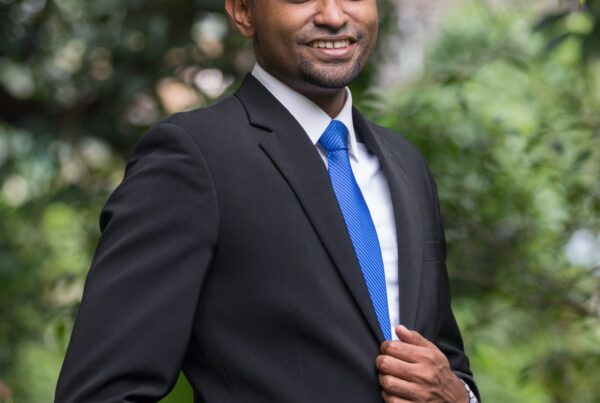Joining the Fellowship
After SPM, Anders accepted a scholarship to study Applied Geology in a local private university. “I spent my formative tertiary years in Miri and was blessed with a chance to study my final year in Perth, Australia. Coming back, the market at the time wasn’t great for the oil and gas industry. So, I started teaching part-time. One Saturday afternoon, a bunch of my university friends pushed me towards taking a leap of faith to join Teach For Malaysia, as they believed I had the right skills and attitude for it. This gave me the confidence to continue with my application. Another inspiration is my mother who is also a teacher; she would also play a part in my decision to continue teaching in East Malaysia later”, said Anders.
The Fellowship in a Nutshell
On his Fellowship experience in Klang, Anders says, “My experience teaching in an island school which was mainly occupied by the children of fishermen will always be a bittersweet memory. I’m thankful for the amazing colleagues I had, as well as the many memories I’ve made with my kids. They’ve always motivated me to be a better teacher. It was tough as they grew up in an environment where English is in limited usage and parents don’t necessarily see the importance of education. Most of them wanted them to grow up and take over their parents’ fishing business, which was lucrative, so it was difficult to help them see why learning was important and how it could help them get to greater heights and provide more opportunities. Because of them, I had to learn to speak Mandarin so that I could carry out effective lessons. It was not all a loss though; one girl who used to fail English in my classes is today studying law at Sunway University after scoring an A for English in SPM. I looked forward to every class where I get to teach individuals like her and do my best for them.”
Were his students the toughest challenge though? “Not in the slightest! The toughest challenges were the dilapidated infrastructure of the school, the lack of clean water at times, and the sweltering heat. At least, in my opinion,” he remarks.
His Decision to Continue Teaching

After the Fellowship, Anders decided to stay on as a public school teacher and applied to return to Sarawak to continue his service. He was surprised to be able to get a place in Sarawak almost immediately, due to the large need for teachers in the state.
“I believe that there is a need for Sarawakians to contribute to education, more so in Sarawak because we have a unique perspective on life. Harmony and unity is our song, and no one in Malaysia would hear it if we choose to be silent. Prior to teaching in Miri, I was teaching in West Malaysia and I found that many are still unaware of the issues in Sabah and Sarawak. I believe that this is because there are not enough of us sharing stories that represent the Bornean perspective. Instead of creating further dissent and segregation, it is important for us to educate and raise a generation of individuals that embrace each other’s culture and values,” Anders says of why he decided to return to Miri to teach. You can read more about that decision sini.
Anders found a number of differences in the students and communities of his island school and his current school in Miri. He says, “In Klang, I had to really build a friendship with the kids because of the harsh environment and the skewed perspective of the parents. Teachers are often seen in a negative light and with prejudice. In Sarawak, students generally respect and honour teachers. It’s rare for students to cross the line and disrespect teachers, and even when they do, it’s often very mild.”
“However, the disparity in education inequity is so evident here in Miri. I’m teaching a few weak classes and there is easily a bunch of 10-15 students who are really poor. No access to technology or books for revision. Some of them are not able to read yet you are expected to help them in a mixed ability class. You can see that those from “richer” families are the ones who score higher in exams. How am I to teach when my kids are starving or don’t have petrol to go to school? More help is definitely needed in this part of the country.”
Student Impact Since Then
 However, Anders did not just stand by and watch his kids stay disadvantaged. In 2018, he coached a team of choral speakers from his school to second place in the district competition, from 12th place the year before. He wrote the script ‘How the Orang Utans Saved Sarawak’, which he adapted from an article to suit the background of his students.
However, Anders did not just stand by and watch his kids stay disadvantaged. In 2018, he coached a team of choral speakers from his school to second place in the district competition, from 12th place the year before. He wrote the script ‘How the Orang Utans Saved Sarawak’, which he adapted from an article to suit the background of his students.
“Last year, I came across an article on how the Ibans of the past learned a lot from the behaviour of orang utans in their surroundings, which shaped their beliefs as a community. As my students were mostly Iban, I thought that this was a great opportunity for them to take up and be proud of the identity that they have. The script also talked about preserving our cultures through preserving nature, as many orangutans and forests are at risk. It was an unforgettable feeling for the students when they won second place.”
Besides the choral speaking competition (which he is also heading this year!), Anders has been actively developing students to take part in STEM competitions around Sarawak with his colleague, Puteri (2015 Teaching Alumna). This extra effort put into developing these students is paying off:
“We won 2nd place last year at Curtin’s Annual Crocodile Challenge. My students had to programme an Arduino-based trap that not only captures the crocodile but also keeps it alive to be released later. What was inspiring was that this bunch of students weren’t the most academically-inclined. In fact, some of them failed Science. But given the opportunity, I saw them improve in their critical thinking and they learned how to solve problems. That gave them the boost to do better this year.”
When asked if he plans to expand his efforts to target the larger community, he says, “I am actually quite low-key in school but what matters most is that I’m doing my best in the capacity I have. For me, as long as I’m doing my best one day at a time, I could be inspiring the next kid that makes a great impact on Miri and Sarawak.”




